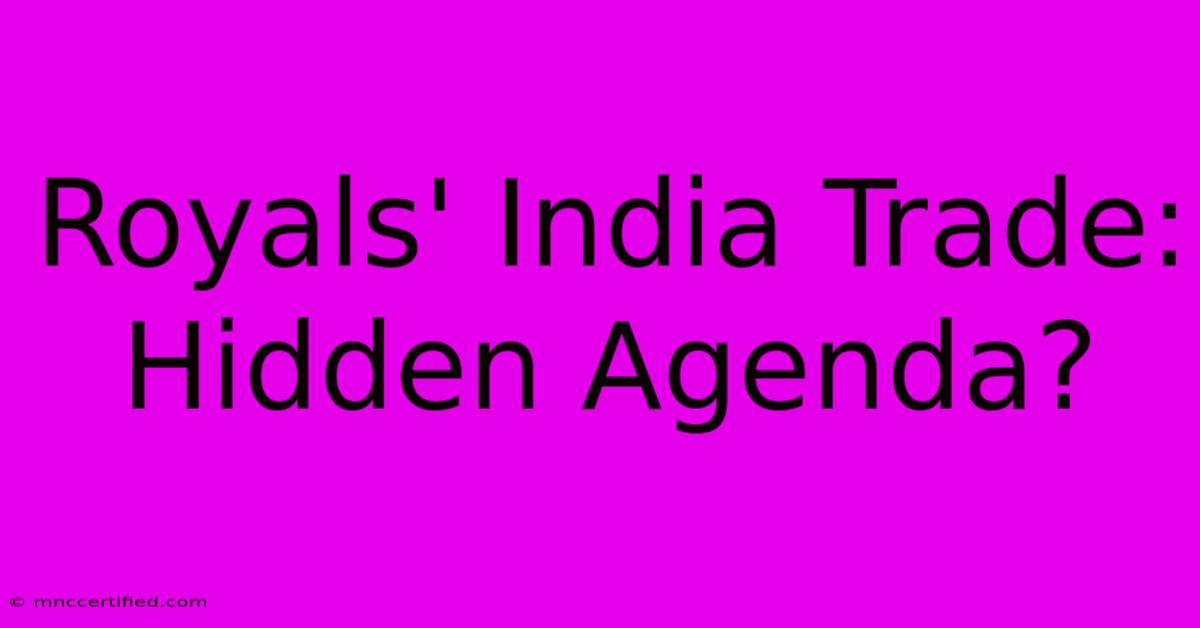Royals' India Trade: Hidden Agenda?

Table of Contents
Royals' India Trade: Hidden Agenda? Unpacking the Complexities of Colonial Commerce
The glittering jewels, the opulent textiles, the lucrative spices – the trade between the British Royal Family and India during the colonial era is often romanticized. Images of lavish gifts and exotic goods abound. However, beneath the surface of this seemingly mutually beneficial exchange lies a far more complex and, some would argue, sinister reality. Was the Royal Family's involvement in India trade merely a matter of economic gain, or were there deeper, more insidious motives at play? This article delves into the history, exploring the potential "hidden agenda" behind this lucrative relationship.
The Illusion of Mutuality: Gifts, Plunder, and Power
The narrative frequently presented focuses on the exchange of gifts between Indian rulers and the British monarchy. Magnificent artifacts, including diamonds, silks, and other precious items, found their way to the British crown, often presented as tokens of goodwill. However, this depiction glosses over the brutal realities of colonial rule. These "gifts" were often extracted through coercion, taxation, and outright plunder, masking the exploitative nature of the trade relationship. The vast wealth extracted from India fueled the British Empire, directly benefiting the Royal Family and the aristocracy.
The East India Company: A Royal Pawn?
The East India Company, while ostensibly a private entity, enjoyed a close relationship with the British crown. Royal charters and patronage significantly influenced the Company's activities in India, facilitating its monopolistic control over trade and resources. The profits generated by the Company, amassed through questionable means, flowed directly into the coffers of the British aristocracy, enriching the Royal Family indirectly but substantially. This indirect involvement raises questions about the Crown's culpability in the exploitative practices of the East India Company.
Beyond Material Gain: Strategic Geopolitics
The trade relationship extended beyond mere economic gain. Control over India's trade routes and resources was crucial for British global dominance. The Royal Family's involvement solidified Britain's position on the world stage, bolstering its political and military power. The acquisition of valuable Indian goods served as a symbol of this dominance, enhancing the prestige and power of the British monarchy.
Unmasking the "Hidden Agenda": A Critical Perspective
While the outward display was one of mutual exchange, a closer examination reveals a system built on exploitation and inequality. The "hidden agenda" wasn't necessarily a secret conspiracy, but rather a consequence of a deeply ingrained colonial mindset that justified the subjugation of India for the benefit of Britain. This perspective highlights:
- The systemic oppression of the Indian population: The wealth extracted from India came at a tremendous human cost, with widespread poverty and suffering being the inevitable consequence of colonial rule.
- The legitimization of colonialism: The Royal Family's participation in the trade lent legitimacy to the colonial project, reinforcing the narrative of British superiority and justifying the exploitation of Indian resources and people.
- The long-lasting impact on India: The legacy of colonial exploitation continues to affect India today, highlighting the enduring consequences of the trade relationship.
Modern Implications and Ongoing Debate
The legacy of the Royal Family's involvement in India trade remains a contentious issue. While some emphasize the historical context and acknowledge the complexities of the era, others criticize the ongoing failure to fully address the injustices of colonialism and its lasting impact on India. Calls for reparations and a more transparent acknowledgement of the past continue to be debated.
Conclusion: A Necessary Re-evaluation
The Royal Family's India trade wasn't simply a matter of exchanging goods. It was a complex web of economic exploitation, political maneuvering, and the reinforcement of colonial power. Understanding the "hidden agenda" requires moving beyond romanticized notions of gift-giving and confronting the harsh realities of imperial rule. By critically examining this historical relationship, we can gain a deeper understanding of the lasting impact of colonialism and work towards a more just and equitable future. Further research into archival records and a more nuanced understanding of the socio-economic structures of the time are crucial for a complete picture. The narrative needs to move beyond simplistic narratives and embrace the complexities of this historical relationship.

Thank you for visiting our website wich cover about Royals' India Trade: Hidden Agenda?. We hope the information provided has been useful to you. Feel free to contact us if you have any questions or need further assistance. See you next time and dont miss to bookmark.
Featured Posts
-
Leitch Insurance River Falls Wi
Nov 24, 2024
-
Kentucky Vs Texas Ncaa Football Tv Info
Nov 24, 2024
-
Opencare Life Insurance Reviews
Nov 24, 2024
-
Iowa Vs Maryland Big Ten Football Photos
Nov 24, 2024
-
Stream Arizona State Byu Football Game
Nov 24, 2024